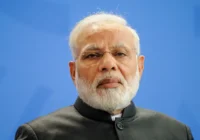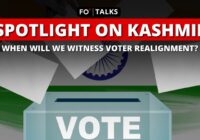In the last of a five-part series on opinion polls about the Indian elections, national security has overtaken the economy to become the main electoral issue, but things may change by the time the polls close.
The CVoter Tracker, an opinion survey of voters, found that Indian Prime Minister Narendra Modi’s popularity dipped after his first year in office. A significant 63% of those surveyed found his government to be anti-poor and anti-farmer. As Modi completes five years in office, his popularity is touching an all-time high despite repeated stories about India’s economic woes.
In April 2014, when the coalition led by the Indian National Congress was in power, the top two issues people cared about were corruption and inflation. Six months after Modi won the 2014 elections, unemployment emerged as the most important issue for Indian voters. Till January 2019, this remained the case. Yet voters seem to be less concerned about it right now. What happened?
The explanation is best delivered through an analogy. Imagine you are suffering from many ailments and many parts of your body are aching terribly. You go to a doctor and list down all the problems: headache, stomachache, backache, knee pain, twisted ankle, spondylitis, tennis elbow and a few more aches. But before the doctor begins treating you for all symptoms, you ask him to do something about your backache because you claim it’s killing you. When you go to meet the doctor next, you request relief for knee pain, and the next time you beg relief from spondylitis. All this time, you are suffering from a chronic migraine that refuses to go away, but other pains push it into the background. That is precisely what has happened to the Indian voter’s chronic unemployment problem.
The answer may lie in public perception. Almost 42% of the people who mentioned unemployment as a problem felt that Modi’s Bharatiya Janata Party (BJP) would solve the problem. In contrast, only 13% believed that the Congress party would be able to do so. Also, 53% of the people surveyed believe that their quality of life would improve in the next 12 months. Only 17% were pessimistic and believed otherwise. This high index of optimism is working in favor of Modi and the BJP.
THE PULWAMA EFFECT AND POPULIST SOPS
The most important factor in the ongoing election might turn out to be the attack on Indian troops in Pulwama. It is an emotive issue that resulted in a national outpouring of grief. Modi’s bold airstrikes won popular acclaim and boosted his popularity. Mainstream media oxygenated the entire episode. As a result, people seem to be willing to forgive Modi’s policy failures as honest mistakes of a risk-taking, dynamic prime minister.
In the past, security has not played much of a role in Indian elections. Manmohan Singh was re-elected as prime minister despite the 2008 Mumbai attacks. Terror strikes and security issues have, for the most part, remained a non-issue in CVoter Tracker data. Before the Pulwama attacks, the recall rate of these issues was a mere 3%. This has risen to a high of 26%. It seems India might be changing. For the first time, security issues are competing with bread and butter ones in India’s post-independence history.
At the start of 2019, 37% of the people surveyed believed their living standards had improved over 12 months, while 31% felt they had declined. The BJP had lost elections in three states in the Hindi heartland: Madya Pradesh, Chattisgarh and Rajasthan. There was real fear that Modi would lose like Atal Bihari Vajpayee, the BJP prime minister from 1999 to 2004. The specter of 2004 was haunting the party 15 years after it unexpectedly lost the election.
Modi is an arch pragmatist and decided to go on a populist spree. He gave reservation to economically backward upper-caste families, a measure designed to retain the traditional vote base of his party. Money for farmers, targeted cash transfers to the poor and a budget full of goodies for different sections of society soothed frayed nerves of voters.
By March 7, 2019, 45% people reported improved living standards and only 22% said these standards had declined. On the same date, 51% respondents said they were very satisfied with the working of the Modi government in contrast to 36% on January 1. The combination of populist benefits for voters and patriotism post-Pulwama boosted the fortunes of Modi. In fact, his personal popularity ratings doubled between January 1 and March 7. People repeatedly contrasted Modi’s bold action to Singh’s lukewarm response to the Mumbai attacks more than 10 years ago. The fact that Modi is the first Indian prime minister to attack Pakistan in its own territory, on its own sovereign soil, since Indira Gandhi has worked strongly in his favor.
RAHUL GANDHI, MODI’S BEST FRIEND
At the start of 2019, Rahul Gandhi’s stock seemed to be rising. This fifth-generation heir of the Nehru family had gone around the world to elite universities such as Berkeley and the London School of Economics. His party, the Indian National Congress, had won three state elections in the Hindi heartland. Hearteningly, his approval rating was 23% on January 1. Recently, his approval rating has plummeted to 8%.
Just as Pulwama worked in Modi’s favor, it has worked against Gandhi. Indians no longer trust the Congress party on national security. Most Indians believe that the party has been soft on Pakistan since 2004. Its inability to guarantee security during its time in power and its perceived softness on terror has come back to haunt Congress in 2019.
The BJP has been very clever in its electoral strategy. It has portrayed the 2019 election as a binary choice between Modi and Gandhi. This bipolar choice has resulted in people favoring the 56-inch chested Modi to the weak, inarticulate and ineffectual Gandhi. It has led many pundits to remark that Gandhi is Modi’s best friend. And there is more than an element of truth in that comment.
BANANA PEELS STILL REMAIN
In India, anti-incumbency factor has been running strong in elections for the last two decades. Politicians are rarely able to meet people’s expectations. So, people vote in the opposition to punish the government. The Modi government is not exempt to this powerful phenomenon. On January 1, 27% wanted to vote it out. By March 7, this number had dropped to 20%, a still significant figure.
Even as the anti-incumbency number has dropped for the government, the number of undecided voters has risen from 42% to 47%. This is evidence of a polity in flux. These voters could swing either way by the time they enter the polls. This is the most worrisome fact for the BJP. If these voters started blaming Modi for their economic woes, then he too could end up with the same fate as Vajpayee.
In 2014, people voted for a non-Nehruvian management of the economy. They wanted less control by the Indian state, which had spectacularly mismanaged the economy. However, demonetization as well as imposition of the goods and sales tax increased the heavy hand of the state. In fact, many have come to believe that Modi is obsessed with increasing tax revenue to exclusion of everything else. This has strengthened the inspector-raj infamously created by Congress.
 In fact, the BJP has made no structural or institutional break from the past. It is just seen as a cleaner and more efficient version of the Indian National Congress. Prime Minister Modi offered no new ideas about governance or the economy. For the last five years, the government has launched one scheme after another and initiated many welfare measures, but the sentiment on the street is negative. Consumption has fallen, investment remains low and controversy rages around unemployment figures. Economic woes might still cause the undecided voter to flip into an anti-incumbent one.
In fact, the BJP has made no structural or institutional break from the past. It is just seen as a cleaner and more efficient version of the Indian National Congress. Prime Minister Modi offered no new ideas about governance or the economy. For the last five years, the government has launched one scheme after another and initiated many welfare measures, but the sentiment on the street is negative. Consumption has fallen, investment remains low and controversy rages around unemployment figures. Economic woes might still cause the undecided voter to flip into an anti-incumbent one.
In 2014, the BJP ran as an opposition party enjoying the anti-incumbency factor. Today, it faces an opposition that has come together to unseat it from power. Furthermore, India’s democracy follow the first-past-the-post Westminster model. Victory in 543 distinct seats decides who forms the government, not the winner of a pan-national election. It is well within the realms of possibility that Modi’s BJP might fall short of the magic figure of 272 seats in the Lok Sabha, India’s lower house of parliament.
A final factor weakening the BJP is not unemployment of the masses, but the unemployability of a large number of its members of parliaments. Many of its MPs are “good-for-nothing” and have relied on the goodwill for Modi to get elected. More than external injury, the BJP faces the clear and present danger of severe “internal bleeding” that might damage its chances. Like the Communist Party of India (Marxist), the BJP is a cadre-based party. The communists lost power and relevance once their cadres rotted and lost touch with the people. The BJP faces a similar risk as its cadre and elected representatives seem to be following the communist path.
*[Click here to read the five-part series.]
The views expressed in this article are the author’s own and do not necessarily reflect Fair Observer’s editorial policy.
Support Fair Observer
We rely on your support for our independence, diversity and quality.
For more than 10 years, Fair Observer has been free, fair and independent. No billionaire owns us, no advertisers control us. We are a reader-supported nonprofit. Unlike many other publications, we keep our content free for readers regardless of where they live or whether they can afford to pay. We have no paywalls and no ads.
In the post-truth era of fake news, echo chambers and filter bubbles, we publish a plurality of perspectives from around the world. Anyone can publish with us, but everyone goes through a rigorous editorial process. So, you get fact-checked, well-reasoned content instead of noise.
We publish 2,500+ voices from 90+ countries. We also conduct education and training programs
on subjects ranging from digital media and journalism to writing and critical thinking. This
doesn’t come cheap. Servers, editors, trainers and web developers cost
money.
Please consider supporting us on a regular basis as a recurring donor or a
sustaining member.
Will you support FO’s journalism?
We rely on your support for our independence, diversity and quality.






